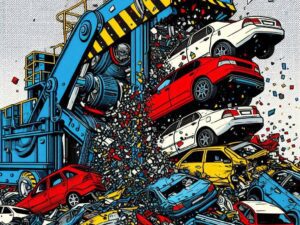What’s Next for Petrol Prices in 2022

Motor trade industry organisation, the RAC, have warned motorists look to be on the receiving end as they fear petrol prices will not be coming down anytime soon! Fuel prices continued to rise recently despite falling wholesale costs globally, prompting the question on every motorists’ lips, where are petrol prices heading in 2022?
Speaking directly with a national UK newspaper the director of UK Fuel at FLEETCOR, Mr Holland said there was a huge amount of volatility in the oil market, saying: “Covid is causing a lot of chaos.”
Oil prices have fallen in recent weeks due to a combination of the new Omicron Covid 19 pandemic variants causing a panic around demand, as well as a decision by the Organisation of Petroleum Producing Countries (OPEC) to stick with plans to ramp up daily production in January 2022 by 400,000 barrels.
One senior investment UK analyst said the decision: “As far as petrol prices are concerned, although they are inevitably linked to the price of oil, there are many other factors to consider such as refining capacity and demand for other oil, that the fluctuations of Brent or WTI crude does not immediately translate to a similar movement at the pumps.”
Mr Holland also explained that oil prices wouldn’t necessarily fall next year due to OPEC’s decision, explaining this would already have been priced in. Adding that OPEC had also left the door open for changes to the production plans if the Covid situation changes. Analysts cautioned that if the new Omicron variant spreads, increased government restrictions could lead to a fall in oil demand, particularly if global travel is affected as it has since the pandemic started.
Even though wholesale petrol prices fell by around 10p during the month of November, the average cost of unleaded petrol currently stands at 147.28p a litre. Which is why the RAC believes there is no justification for the high prices on the UK garage forecourts, calling for a drop of 12p a litre for petrol and 7p for diesel, saying retailers should clearly explain the reasons for charging current prices.
Unfortunately, unlike a good motor trade insurance policy, there’s no guarantee of help coming when drivers need it the most.

The price at petrol pumps has fluctuated a great deal in recent times, with motorists seeing costs being pushed higher and higher. Data recently released by private and motor trade road recovery service, the RAC, showed petrol prices rising again in November with many retailers adding over 3p on average to every litre purchased.
Fuel spokesman, Mr Williams from the RAC, called for greater Government action: “It’s a sad fact that the Chancellor’s fuel duty freeze last month, while welcome, simply wasn’t anywhere near enough to ease the burden now being placed on millions of households who have no choice but to use their vehicles.
While the Chancellor could introduce a temporary cut in VAT on motor fuel it might be better for the Government to ask the biggest retailers to explain why they’re charging such high prices for fuel when wholesale prices have dropped.”
British Retail Consortium spokesperson said: ““Supermarkets are keen to provide their customers with the best value for petrol through their forecourts, offering the cheapest petrol in the country.
“Supermarkets work hard to pass on changes in wholesale prices to relieve pressure on consumers, though prices at the pump will be influenced by various forces, including tax, oil prices and operational costs.”






